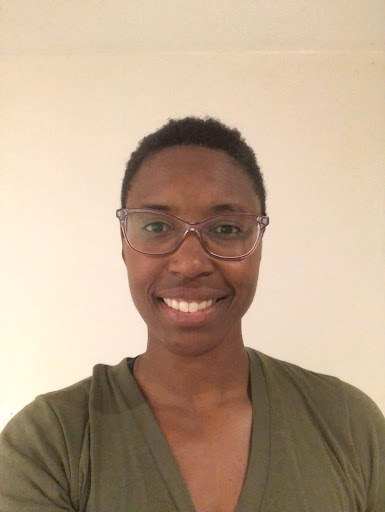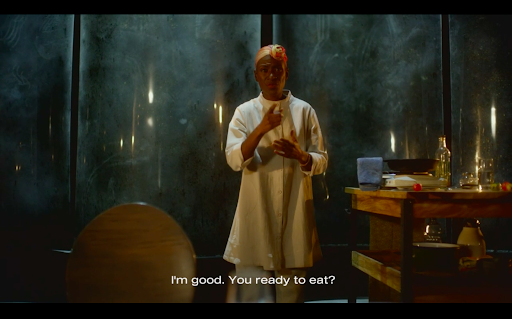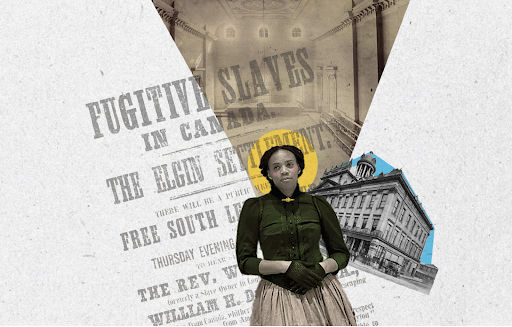Lisa Karen Cox's numerous projects make waves in the Toronto theatre scene

Between writing new innovative projects, to directing for theatre and film, Lisa Karen Cox (she/her) has had a busy year.
Lisa first joined the acting faculty during the 2020/21 school year, having already experienced the challenge of pivoting from in-person to online in a school setting. She was working on a stage adaptation of Anna Karenina at University of Toronto, Mississauga (UTM) when the pandemic hit in fall 2020.
“Zoom today is not what Zoom was in September 2020,” Lisa reflects. “Zoom has magically been scrambling behind the scenes,” trying to figure out how to adapt it’s platform for the variety of situations it is being used for.”
Instead of viewing the pivot to online as a negative, Lisa decided make the most of it.
“[I decided to] treat this as an experiment, which it is. We can be honest with ourselves and say, ‘what a great opportunity for acting students.’ If we fail, it’s okay. There’s no preconceived notion about how this should work, or what this should look like. This is beautiful, actually. We can throw our ego to the wall a bit, so we’re free and playful and open... that’s how we should approach all of our work.”
While the pandemic has created difficulties for live performers, Lisa looks at it as a challenge. “If you can’t handle pivoting, I worry about you in this industry,” Lisa shares. “If you can’t find the joy, the curiosity, the openness to pivot - it’s not that you shouldn’t be in the industry, but I do worry about you in the industry.” Whether it’s COVID-19, or a grant that falls through, or issues with the permit for the performance space - life happens, and all the little things that come together to build a performance never quite fall in place the way you imagine, pandemic or not.
This perspective comes from someone who has stepped out of the industry, more than once. Lisa first took a step back from her career as an artist because her partner was hit by a truck, and was unable to walk. “I couldn’t be an artist with that level of pressure on my soul.” As their health came back, Lisa realized she needed something financially to fall back on if she was going to continue her career. She went back to university, and became an elementary school teacher: “that decision drastically changed me as an artist.”
Something that is often missed in conversations about acting careers, is the amount of privilege it requires for people to succeed. Being an actor means never knowing where the next paycheque will come from, you have to be flexible to leave at a moment’s notice to run to an audition across the city or film a self tape in the next 24 hours.
“We live in a capitalistic society,” Lisa points out, “so if you don’t come from money, that’s most likely going to impact you.” People crave safety and certainty, but if you’re “in an industry where there’s no consistent paycheck, how can you feel safe?”
Everyone's answer to this is different: what do I need so I can feel safe in life, so that I can do my art? For me that meant, I’m gonna go to teachers college, because then I can be a supply teacher. I can work: I don’t have to do lesson plans: I show up, I teach that day, I leave. If I have an audition, I don’t work that day. It offered me the flexibility and the stableness I needed to do my art.
As someone who has experienced leaving the industry in order to create safety and stability for herself, Lisa knows the importance of creating structure for yourself as an artist. “We’re not honest about the fact that a lot of artists in the Canadian landscape come from money, or have a very strong support system - financial, or emotional. If you don’t come from that, you have to ask yourself - how can you put those things in place, so you can feel that support? It changes you physiologically”
Since then, Lisa’s career has blossomed. Last year, Lisa directed an episode of CBC Gem’s 21 Black Futures (external link) , in collaboration with Obsidian Theatre. This series examines the question “what is the future of blackness?” with each episode featuring a new creative team. Lisa directed Season 1 Episode 4, Beyre (external link) , which thoughtfully examines a woman’s decision to ensure the survival of her Ebanu culture, by teaching her traditionally signed-language, to her 10-year-old daughter Bena.

Photo from 21 Black Futures, Season 1 Episode 4: Beyere. Performed by Natasha ‘Courage’ Bacchus, directed by Lisa Karen Cox, written by Shauntay Grant. Set and costume design by Rachel Forbes. Lighting design by Shawn Henry.
Beyre focuses on the intersections of Blackness, motherhood, and Deafness. It’s also a reflection on grief and what we pass on to the next generation. Ensuring the next generation has a sense of and a pride in their history. In terms of Blackness, there’s so much ‘trauma porn,’ there’s so much oppression, and painful memories. But there’s also joy, beauty, and pride, and perseverance, and resilience, and those beautiful tales and stories don't get shared as frequently. Especially at that intersection. So it was really important to try to highlight that and bring it forward: the mash-up of grief and hope.
Last year, Lisa also directed a staged reading of No Knowledge College by Naila Keleta-Mae, a piece which is a part of Dr. Keleta-Mae’s Black liberation writing. “This reading was really important,” Lisa emphasizes, “because in Canada, we have a very American view of what it means to be Black. This piece blows it apart. They are Black female academics, which is not something which gets seen very often. And within that, typically we would try to make everyone the same. But in this case, it’s four very different characters and personalities, even though the mainstream would want them all to be identical.

Poster for 1851: Spirit and Voice.
Lisa’s endeavor to “smash the idea of any kind of monolith” continues with one of Lisa’s upcoming projects in partnership with Soulpepper Theatre Company, Zero11Zero, and Ontario Black History Society, 1851: Spirit and Voice (external link) . This project is “an online theatrical experience revisiting the 1851 North American Convention of Coloured Freemen, where past and present collide.” Historical figures meet present-day people, and grapple with the way history has been written, as well as issues that affect Black lives today.
“We’re very in some ways lucky in 2022,” Lisa points out, “because we do have these elders we can reach back to and stand on their shoulders, even if they’re not with us, and this is a way to bring that to light. But how can we do that with joy? How can we talk about racism and be joyful simultaneously? How can we skate that line of ‘oh I laughed at that... should I have laughed at that?’ How do we promote reflection through humour?”

With 2022 off to a busy start, Lisa has a number of other projects in development to continue throughout the year. One upcoming directing project Lisa has is SugarPlum with Nightwood Theatre, “an investigation of the Nutcracker, and anyone who has been pushed out of the ballet” with a particular focus on queer and racialized voices.
Additionally, Lisa is writing, directing, and acting in a 20 minute interactive audio piece for children, examining “the hero’s journey through the lens of a child, in a non oppressive framework… If you try to describe a physical space, automatically, you’re talking about socioeconomic class and culture.” With the goal of having every kid be the hero, Lisa wanted to remove those two features, so any child and family could participate.
Whether as a director, teacher, or colleague, everyone who works with her is lucky to have such an innovative and thoughtful artist on their team.
